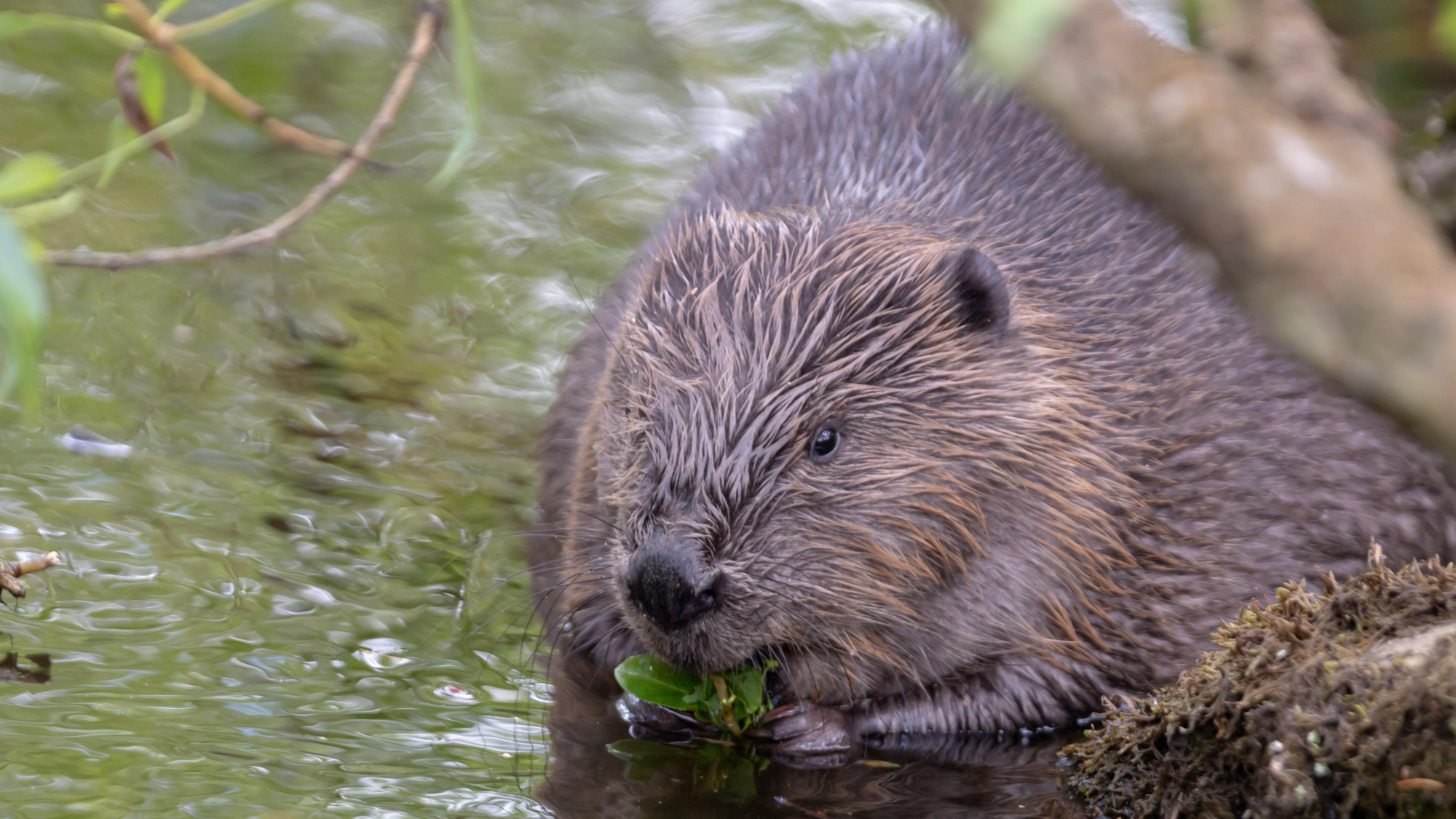The great beaver comeback
Illegal 'beaver bombing' is on the rise as activists release rodents into rivers

A free daily email with the biggest news stories of the day – and the best features from TheWeek.com
You are now subscribed
Your newsletter sign-up was successful
Britain's beavers were hunted to extinction 400 years ago for their lustrous fur and castoreum – a musky secretion used in perfumery until the 20th century. But in the last decade, growing numbers of the giant rodents have been spotted along the country's waterways.
At first, these "implausible sightings" were "dismissed as otters", said Tom Whipple in The Times. However, there was only so long the "nibbled branches" and "unexplained dams" could be ignored before it became obvious beavers were back.
'Beaver bombing'
Their return can be put down to a phenomenon called "beaver bombing" – covertly releasing beavers into the wild, said Patrick Barkham in The Guardian. Fed up with successive governments' failure to approve releases (despite Boris Johnson's 2021 pledge to "Build Back Beaver") conservationists have been taking matters into their own hands.
The Week
Escape your echo chamber. Get the facts behind the news, plus analysis from multiple perspectives.

Sign up for The Week's Free Newsletters
From our morning news briefing to a weekly Good News Newsletter, get the best of The Week delivered directly to your inbox.
From our morning news briefing to a weekly Good News Newsletter, get the best of The Week delivered directly to your inbox.
Despite "no official releases", beavers have been appearing across Somerset, Wiltshire and Gloucestershire. There's even an "established population" of around 200 beavers that have been "illegally" living "freely and largely unnoticed" in lowland Kent.
In 2022, with numbers continuing to grow, beavers were acknowledged as a native species, making it illegal to capture, kill or disturb them. While it seemed this announcement would "pave the way" for reintroductions of wild beavers, said Helen Briggs on the BBC, a strategy failed to materialise.
Instead, there have been a series of schemes across England that have seen beavers released into fenced-off sites. In 2023, London Mayor Sadiq Khan released a family of Eurasian beavers into a controlled enclosure at a nature reserve in Ealing, west London, naming one Taylor Swift because she "came back again and again for the cameras", said Ross Lydall in the London Evening Standard. This August, two "kits" arrived – the first baby beavers to be born in urban London for four centuries.
But while Khan has been vocal about his hopes for the release of beavers and further rewilding initiatives, said Helena Horton in The Guardian, it remains "unclear" whether the Labour government will put in place a reintroduction strategy.
A free daily email with the biggest news stories of the day – and the best features from TheWeek.com
For now, save for one "official" population of wild beavers that have been given permission to stay on the confusingly named River Otter in Devon, England's beavers are "caught in limbo", said Briggs.
'Olympic-sized swimming pools'
The benefits of beavers have been widely documented. From alleviating flooding to boosting biodiversity and improving water quality, scientific studies have shown the semi-aquatic mammals have a significant impact on their environment.
A 10-year study by the University of Exeter and Devon Wildlife Trust looking at the population of wild beavers living on the River Otter found the wetlands created by the beavers stored over 24 million litres of water – the equivalent to 10 Olympic-sized swimming pools.
But there has also been "widespread concern" from farmers around the risks of beaver dams causing "unwelcome floods" on valuable land and damage to their crops, said Barkham.
This hasn't stopped Scotland from taking steps to reintroduce wild beavers. In 2009, the Scottish government authorised the release of 11 beavers in Argyll's Knapdale Forest as part of the five-year Scottish Beaver Trial. After monitoring the study, the government decided to let the beavers stay in 2016, and three years later granted them protected species status. There are now over 1,000 beavers living in the wild in Scotland – a number that's expanding rapidly.
'Battle of the beavers'
Further afield, the "tell-tale incision marks of powerful teeth" have been found in the trees lining the banks of the Tiber River in Tuscany, said Nick Squires in The Telegraph. Like in England, "mystery" surrounds how the beavers got there; since their introduction in 2020 the population has been spreading rapidly from Lombardy to Abruzzo.
One thing is clear: whoever released them went to "great trouble" transporting the beavers from other parts of Europe before covertly releasing them into Italian rivers and streams.
A "battle of the beavers" has since broken out between conservationists and government officials who believe the "guerrilla reintroduction" of beavers could set a "dangerous precedent" for the release of other species and are looking at ways to remove the animals from the wild.
Things are different in Bavaria, said Sam Gandy in Ecohustler, where beavers and humans coexist relatively peacefully. Here, a thriving population of around 25,000 beavers live freely in the rivers, and a trained team of 1,000 volunteer "beaver consultants" work with landowners to mitigate any issues. This could offer a "future glimpse" of what a "beaver inhabited landscape" might look like.
Irenie Forshaw is the features editor at The Week, covering arts, culture and travel. She began her career in journalism at Leeds University, where she wrote for the student newspaper, The Gryphon, before working at The Guardian and The New Statesman Group. Irenie then became a senior writer at Elite Traveler, where she oversaw The Experts column.
-
 The 8 best TV shows of the 1960s
The 8 best TV shows of the 1960sThe standout shows of this decade take viewers from outer space to the Wild West
-
 Microdramas are booming
Microdramas are boomingUnder the radar Scroll to watch a whole movie
-
 The Olympic timekeepers keeping the Games on track
The Olympic timekeepers keeping the Games on trackUnder the Radar Swiss watchmaking giant Omega has been at the finish line of every Olympic Games for nearly 100 years
-
 As temperatures rise, US incomes fall
As temperatures rise, US incomes fallUnder the radar Elevated temperatures are capable of affecting the entire economy
-
 Climate change could lead to a reptile ‘sexpocalypse’
Climate change could lead to a reptile ‘sexpocalypse’Under the radar The gender gap has hit the animal kingdom
-
 Why scientists want to create self-fertilizing crops
Why scientists want to create self-fertilizing cropsUnder the radar Nutrients without the negatives
-
 The former largest iceberg is turning blue. It’s a bad sign.
The former largest iceberg is turning blue. It’s a bad sign.Under the radar It is quickly melting away
-
 How drones detected a deadly threat to Arctic whales
How drones detected a deadly threat to Arctic whalesUnder the radar Monitoring the sea in the air
-
 ‘Jumping genes’: how polar bears are rewiring their DNA to survive the warming Arctic
‘Jumping genes’: how polar bears are rewiring their DNA to survive the warming ArcticUnder the radar The species is adapting to warmer temperatures
-
 Crest falling: Mount Rainier and 4 other mountains are losing height
Crest falling: Mount Rainier and 4 other mountains are losing heightUnder the radar Its peak elevation is approximately 20 feet lower than it once was
-
 The Southern Ocean is holding in a ‘burp’
The Southern Ocean is holding in a ‘burp’Under the radar The heat from the past can affect the future